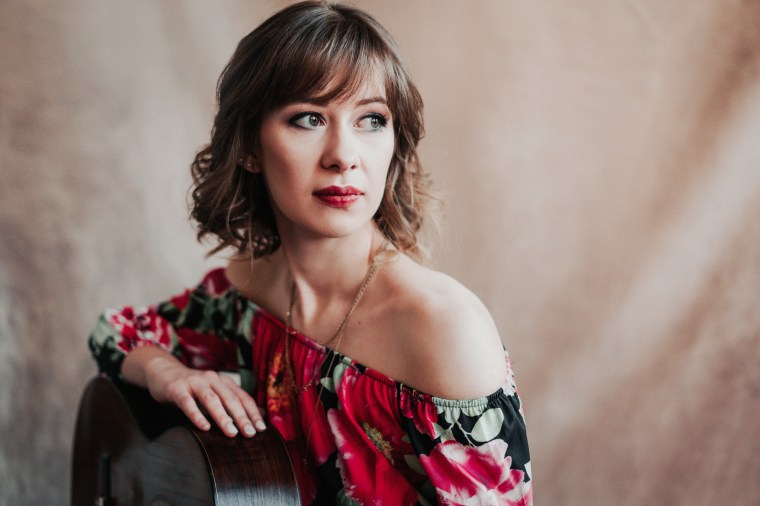The brilliant Polish concert guitarist, Katarzyna Smolarek is becoming known for both her breathtaking virtuosity and her magnificent interpretations. In addition to studying at the Mozarteum in Austria and concertizing throughout Europe, Katarzyna has been awarded over 20 international competition prizes over a very short period of time. The silver lining to sheltering in place in Europe is that she was able to find time to sit down and share her experience, philosophies, and wise advise with Six String Journal readers. Enjoy!

Personal
When did you start playing and why? Or, what drew you to the guitar initially?
I started playing the guitar when I was 8 years old. My parents just signed me up for a music school and I think at the time no one was expecting that I would become a professional musician in the future. With time, I developed a love for playing music and I decided to dedicate my life to it.
What repertoire do you enjoy playing the most?
I enjoy playing all kinds of repertoire from baroque to contemporary music. I think every style has its own proper charm, and I always seek to discover the beauty in each new piece that I learn.
What guitar or guitars do you perform on? strings?
At the moment I perform on a guitar built by Jacek Łozak from 2010. My favourite strings are Savarez Alliance Premium medium tension. Since last year I’m proud to be a part of the Savarez artists family.
Which guitarists have had the most influence on you?
Definitely all of my teachers. Lidia Przyłęcka, Ryszard Bałauszko and Marco Tamayo – they have had a huge influence on my progress, for which I will always be grateful. I consider all of them amazing musicians, dedicated teachers and wonderful people. I was extremely lucky to have them along the way.
What recordings are you most proud of?
I actually haven’t done a lot of recordings in my life (but I’m working on it!). I’m certainly most proud of my recent videos made in Siccas Guitars. They are my most professionally done recordings so far.
What are some up and coming projects (recordings, concerts) you are excited about?
Unfortunately, because of the epidemic of coronavirus a lot of my events have been cancelled. If everything is back to normal soon, I will be able to go to Portugal in June to perform a concert with an orchestra as a part of the International Guitar Festival in Amarante. I am sure I will enjoy it a lot after having such a long break from traveling.
Technique and Performance
How much do you practice? And, do you structure your practice in any particular way?
The duration of my practice varies depending on many factors. I usually practice around four hours per day, but this amount increases before concerts or competitions (or now, because of the quarantine). On the other hand I practice less when I spend time with my family or when traveling. I’m also no stranger to taking days off to relax and reset. I don’t think I structure my routine in some special way.
Usually after I have finished practicing in the evening, I make a plan for the next day so that my practice sessions are balanced and I don’t neglect anything. When I have a whole day for myself I like to break it out into two sessions: morning and afternoon, 2-3 hours each, with a break for lunch and some other activity.
Are there aspects of guitar that you struggle with or that you find you are still working on?
I think there is always room for progress, so in that sense I can say I’m working on every aspect of the guitar performance. I don’t imagine that I will ever have a feeling that there is nothing else to work on and I think it’s a good thing. The constant pursuit of artistic excellence is what brings innovation and life to art.
Do you deliberately memorize music or have a technique that helps assimilate music into memory?
It depends on the piece and the situation. I usually try to learn a piece by memory as soon as possible, so that I can entirely focus on the music. Sometimes the music demands deliberate memorization, and other times the memorization comes naturally after just a few days of playing it. Nevertheless, every now and then I would revise the score, because with time some details might slip away. I also make sure that it’s not only my fingers that remember the piece, but also my brain, in other words that I remember the notes and not only the movements. In order to do that, I play it extremely slowly focusing on every note, or I go through the piece in my mind without touching the guitar at all.
Do you have a favorite drill you use to warm up?
I like to play through a couple of slur and scale exercises before I start practicing pieces. However, I’m not a fan of spending a lot of time warming-up, as for me the ultimate goal is to be ready to perform without having to go through a series of technique exercises. Sometimes we find ourselves in situations when we do not have the possibility to warm up before a concert, and I believe the quality of our performance should not be compromised in those situations.
Do you have any pre-concert rituals?
Not at all. Obviously, it’s important to have a good rest and a good meal, but I wouldn’t call it a ritual. Again, I feel like it’s dangerous to have specific pre-concert routines. In situations when we are not able to perform the routines, we might then lose our confidence on stage as a result.
Advice to Younger Players
What single most important piece of advice about practicing would you offer to younger players?
Solve the problems instead of getting discouraged! I get the impression that a lot of young players don’t really know how to practice. They think that repetition is key and when a passage still doesn’t work after having played it 100 times they start thinking things like, “this piece is too difficult”, “I’m not good enough”, or “I need months/years to play it well”. There is nothing worse than having this sort of approach. Practicing should be all about constructive problem-solving. If something doesn’t work we should be able to exactly tell why and the more precise our answer, the better. We should be extremely conscious of our movements and of our choices. This way we can make progress way faster than by mindlessly repeating.
What repertoire do you consider essential for young/conservatory students to assimilate?
I wouldn’t say that there are any specific pieces that one really must play during his education, although I think that it is essential for a student to be familiar with the concepts of all the historical styles. The more repertoire we already know, the more tools we have for our next interpretations. I would also say that it is important to play the standard guitar repertoire; such as Villa-Lobos’ studies, suites by Bach, sonatas by Ponce, pieces by Barrios, Tárrega, Rodrigo, Turina and so on and so on. Nowadays we tend to look for unknown pieces, we make our own transcriptions and we commission new music. I find it wonderful, however as students we need to familiarize ourselves with traditional repertoire first. This will properly facilitate our lives as performers and teachers.
Recordings that every young guitarist should be familiar with and why?
I think all recordings, no matter good or bad, have their value. Exactly what we listen to is not so important; the crucial part is that we are able to develop an informed opinion and discern what is of high quality and what’s not. What I find extremely useful is listening to a lot of recordings of the same piece and focusing on the differences between them. This helps me understand many possible ways of thinking about the same piece of music.

Tangent
What is the last book that you read? Favorite author/s?
The last one would be Fahrenheit 451. I love Márquez, Llosa and Murakami for their out-of-this world storytelling.
What is your favorite way to spend time when not practicing?
I really like learning new languages. Currently I’m working on my Portuguese. Apart from that I enjoy cooking, reading, dancing salsa and just recently I got terribly hooked on the series “Breaking Bad”.

